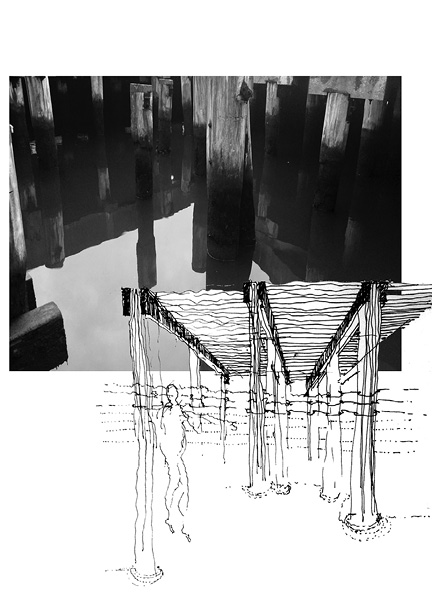
WATER-LOGGED
first performed on March 2, 2016
Performance Arcade, Wellington Waterfront, New Zealand
performed ongoing for five days in 2016
JULIEANNA PRESTON
Wellington, New Zealand
045038300j045038300.045038300p045038300r045038300e045038300s045038300t045038300o045038300n045038300@045038300m045038300a045038300s045038300s045038300e045038300y045038300.045038300a045038300c045038300.045038300n045038300z
julieannapreston.space
WATER-LOGGED
JULIEANNA PRESTON
“Water-logged” was a site-responsive durational performance conceived to make visually and audibly present the virtual and material constitution of a timber pile, including its construction and its social, cultural, and political contribution, and above all, to probe its agency, voice, and vitality. For the five days of an international festival, I donned a wetsuit to swim under a wharf to converse and cavort with a structural element, a portion of a tree felled in Australia, dragged down river, and then shipped to New Zealand more than one hundred years ago. She still stands strong amongst others, her feet saturated, her bark mottled, and her girth worn. A live-stream camera and microphone connected this activity to a viewing audience via a monitor laid horizontally in a shipping container located on top of the wharf directly above the scene.
“Water-logged” adopted an open and processual method—there was no script; the performance unfolded with the simple intention of probing what can emerge at the confluence of material bodies as a spatial provocation. While the technology divulged and recorded the temporal fluctuations of tide, weather, bird life, sea creatures, and urban life, it was the rhythmic, subtle-to-screeching vocal elocutions that marked the human-to-non-human interactions as a fluid ecology.
The performance work tested the limits of human and other material communication in the context of live and place-situated interactions. For me, questioning, even challenging, the long-term culturally constructed ideas that some matter is dead, some matter reigns power over the rest, some matter has more value, some matter is expendable or is at the service of all others, are key to developing an ethical material practice. What might happen if ethical dimensions of respect, difference, even hospitality, were extended to the world of matter, beyond human to human? Is there a chance that such practices and values could have profound impact on human inhabitation? Could that realignment have residual consequences for social hierarchies, environmental ecologies, and subjectivities?